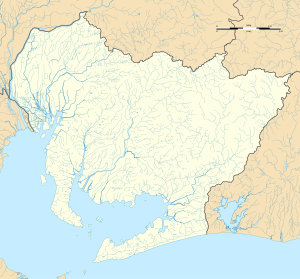Inariguchi Station
Inariguchi Station (稲荷口駅, Inariguchi-eki) is a railway station in the city of Toyokawa, Aichi, Japan, operated by Meitetsu.
 Inariguchi Station 稲荷口駅 | |
|---|---|
_1.jpg) Inariguchi Station in January 2018 | |
| Location | 3-chome Ekimaedori, Toyokawa-shi, Aichi-ken 442-0045 Japan |
| Coordinates | 34.8183°N 137.3880°E |
| Operated by | |
| Line(s) | ■ Meitetsu Toyokawa Line |
| Distance | 6.0 kilometers from Kō |
| Platforms | 1 island platform |
| Other information | |
| Status | Unstaffed |
| Station code | TK03 |
| Website | Official website |
| History | |
| Opened | April 1, 1954 |
| Traffic | |
| Passengers (FY2017) | 494 daily |
| Location | |
 Inariguchi Station Location within Aichi Prefecture  Inariguchi Station Inariguchi Station (Japan) | |

Track layout
Lines
Inariguchi Station is a station on the Meitetsu Toyokawa Line and is 6.0 kilometers from the terminus of the line at Kō.
Station layout
The station has one island platform connected to the station building by a level crossing. The station has automated ticket machines, Manaca automated turnstiles and is unattended.
Platforms
| 1 | ■ Meitetsu Toyokawa Line | For Toyokawa-inari |
| 2 | ■ Meitetsu Toyokawa Line | For Meitetsu-Nagoya |
Adjacent stations
| ← | Service | → | ||
|---|---|---|---|---|
| Meitetsu Toyokawa Line | ||||
| Toyokawa-inari | Rapid Limited Express | Suwachō | ||
| Toyokawa-inari | Limited Express | Suwachō | ||
| Toyokawa-inari | Express | Suwachō | ||
| Toyokawa-inari | Semi Express | Suwachō | ||
| Toyokawa-inari | Local | Suwachō | ||
Station history
Inariguchi Station was opened on April 1, 1954.[1]
Passenger statistics
In fiscal 2017, the station was used by an average of 2592 passengers daily.[2]
Surrounding area
- Toyokawa Inari
- Tobu Junior High School
gollark: ```pythonimport itertoolsimport multiprocessing as mchars = [chr(x) for x in range(32, 126)]chars.extend(["\t", "\n"])def generate_for_length(length): return map(lambda chars: "".join(chars),itertools.combinations(chars, length))def generate(): for i in itertools.count(): for s in generate_for_length(i): yield sif __name__ == "__main__": def start(func): proc = m.Process(target=func) proc.start() io_queue = m.Queue(maxsize=128) def printer(): while True: print(io_queue.get()) code_queue = m.Queue(maxsize=128) def generator(): for x in generate(): code_queue.put(x) def executor(): while True: code = code_queue.get() result = None try: result = repr(exec(code)) except Exception as e: result = repr(e) if result != None: io_queue.put(code + ": " + result) start(generator) for _ in range(4): start(executor) printer()```
gollark: Which do you think is slower: the execution or generation of strings?
gollark: ```pythonimport itertoolschars = [chr(x) for x in range(32, 126)]chars.extend(["\t", "\n"])def generate_for_length(length): return map(lambda chars: "".join(chars),itertools.combinations(chars, length))def generate(): for i in itertools.count(): for s in generate_for_length(i): yield sfor x in generate(): try: print(exec(x)) except Exception as e: print(f"{e} from {x}")```
gollark: I should multithread this!
gollark: ```pythonimport itertoolschars = [chr(x) for x in range(32, 126)]chars.extend(["\t", "\n"])def generate_for_length(length): return map(lambda chars: "".join(chars),itertools.combinations(chars, length))def generate(): for i in itertools.count(): for s in generate_for_length(i): yield sfor x in generate(): print(x)```<@!330678593904443393>
See also
- List of Railway Stations in Japan
References
- Terada, Hirokazu (19 January 2013). データブック日本の私鉄 [Databook: Japan's Private Railways] (in Japanese). Japan: Neko Publishing. p. 255. ISBN 978-4-7770-1336-4.
- "平成30年版豊川市の統計)2.駅別旅客輸送状況(JR)" (PDF) (in Japanese). Japan: Toyokawa City. 2019. Retrieved 5 December 2019.
External links
![]()
- Official web page (in Japanese)
This article is issued from Wikipedia. The text is licensed under Creative Commons - Attribution - Sharealike. Additional terms may apply for the media files.